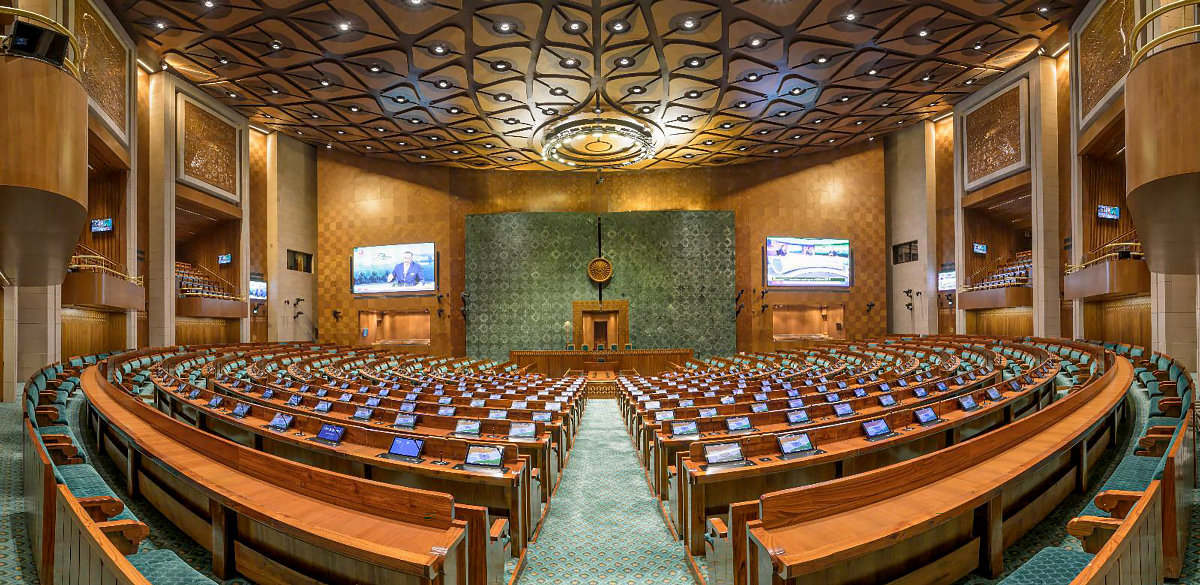New Delhi : In a momentous event, India's Prime Minister, Narendra Modi, has officially unveiled a brand new parliament building, despite facing a significant boycott from over 20 opposition parties who chose not to attend the ceremony.
Nestled in the heart of Delhi, this impressive structure boasts a remarkable triangular design, intended to accommodate both the upper and lower houses of parliament. It stands proudly adjacent to the historic circular parliament building, a relic of the colonial era, which will undergo a transformation into a museum, preserving its historical significance.
Amidst an aura of tradition, the inauguration ceremony commenced on a Sunday morning. Prime Minister Narendra Modi, donning traditional attire, participated in numerous prayer rituals. However, the event was not without controversy. Critics voiced their concerns, asserting that the ceremony overly emphasized religious Hindu symbolism. This drew attention to the question of whether such religious undertones were compatible with the core values of a secular democracy that the new parliament building is expected to embody and safeguard.
Hundreds of opposition party members boycotted the inauguration ceremony of India's new parliament building. They argued that the ceremonial role of the country's president should have entitled them, rather than Prime Minister Narendra Modi, to inaugurate the building. The opposition accused Modi's Bharatiya Janata Party (BJP) government of undermining democracy and consolidating power. They described Modi's decision to personally inaugurate the parliament building as a direct assault on democracy, asserting that the new building held no value when the soul of democracy had been depleted.
In response, the BJP criticized the opposition parties for politicizing the ceremony and called on them to refrain from doing so. After the ceremony, Supriya Sule, a member of the Congress party, the largest opposition party, questioned the government's decision to proceed without opposition participation, stating that opening the new parliament building without opposition involvement rendered the event incomplete and indicated a lack of democracy in the country.
The construction of the £100 million parliament building had been controversial, with allegations that the Modi government aimed to reshape the halls of power in accordance with its nationalist political agenda. Modi had inaugurated the project in 2020, emphasizing its role in witnessing the creation of a self-reliant India. The building was completed expeditiously in under three years, presumably driven by an implicit deadline before the 2024 general election, where Modi intends to seek a third term in office.
The Central Vista project, costing over $2.4 billion, involved the construction of a new government secretariat, prime minister's residence, and office. Criticized for lack of transparency, the project was awarded to architect Bimal Patel, who comes from Prime Minister Modi's home state of Gujarat and has worked on significant government projects.

The government and project architects argued that the old building, nearly a century old, was no longer suitable and could not be adapted to modern needs. The new complex is three times larger than the previous one and can accommodate more than 1,200 MPs, surpassing the capacity of the original parliament by over 500 seats. Although India currently has 800 representatives across the upper and lower houses, the number of MPs is scheduled for review in 2026. With India's population reaching 1.4 billion, there may be an increase in the number of MPs.
The architect incorporated materials and designs from various parts of India to represent the country's cultural diversity and different architectural styles. This included using marble from Rajasthan and teak from Maharashtra. Additionally, Prime Minister Modi placed a sacred Sengol, a gold sceptre received by India's first prime minister, Jawaharlal Nehru, during independence in 1947, in the new parliament chamber.